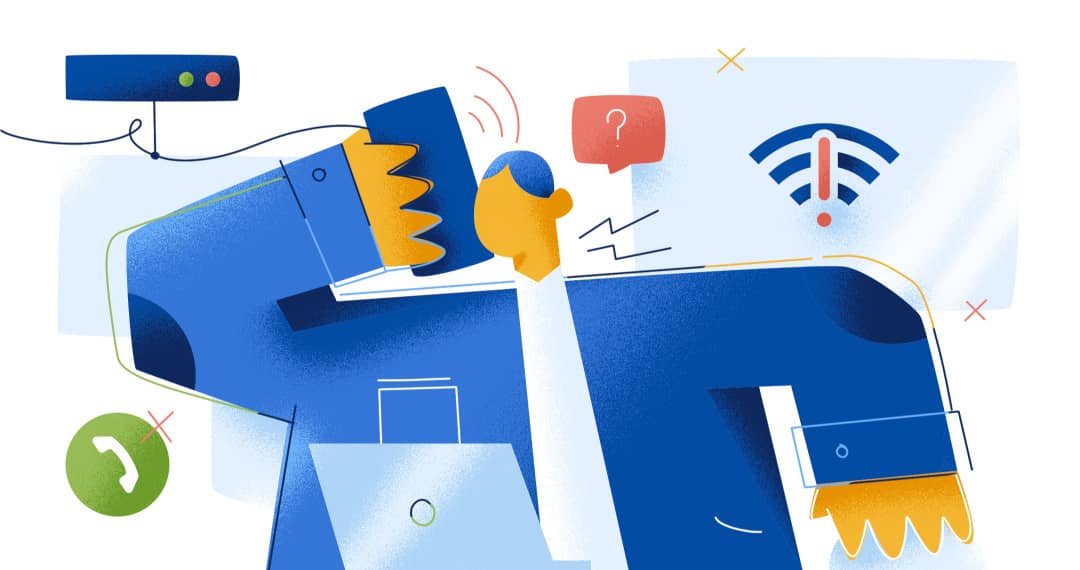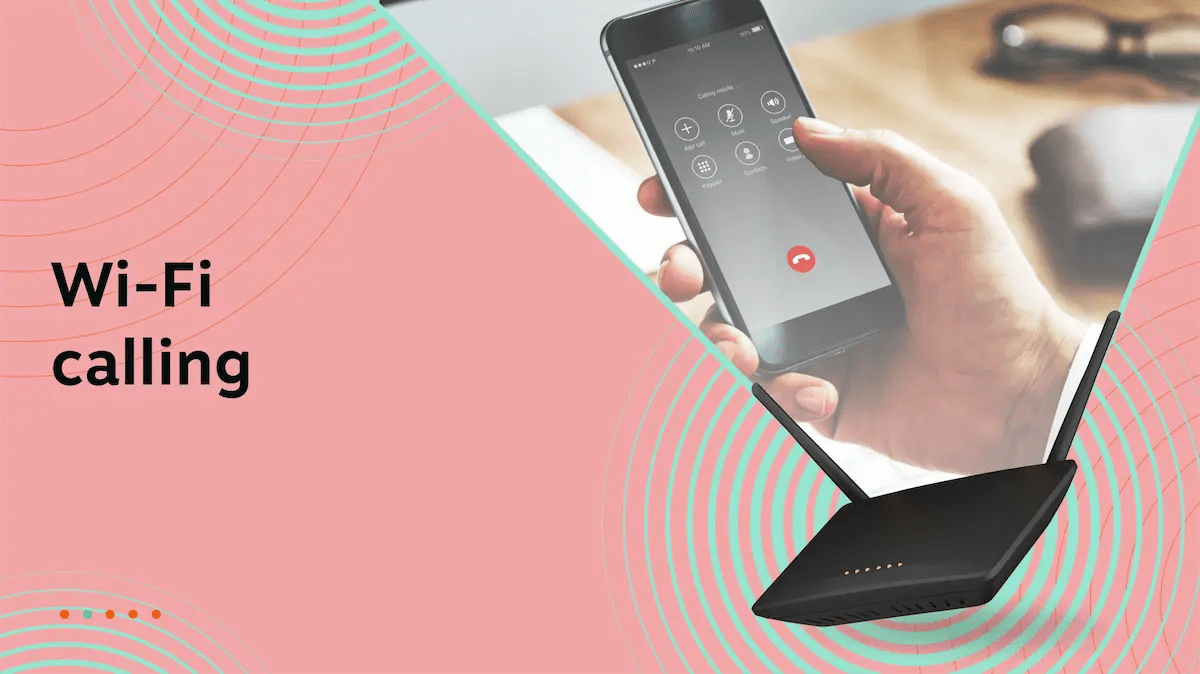With Session Initiation Protocol (SIP), you can move your existing PBX phone system to the cloud. With SIP, Voice over Internet Protocol is possible.
Here’s a wild guess: your company’s success depends on how well you can communicate. And not just with your customers, but also prospects, partners, vendors, and coworkers.
If the systems that support your business communication aren’t reliable or up-to-date, you’ll struggle. Phone calls are a big one. If you’re dealing with inefficient phone systems or high expenses (or both), you’ll want to consider an SIP trunk provider.
You can run your voice calls, video calls, and instant messaging through an internet-based VoIP phone service provider.
SIP calling will transform the quality of your business phone system while lowering its cost. In this guide, we’re breaking down how SIP works and how you can make the most of it.
What Is SIP Calling?
SIP calling, or Session Initiation Protocol calling, is the process of transmitting voice calls over a SIP trunk or a SIP channel. It’s often interchanged with VoIP calls. However, SIP calling actually uses VoIP to move your analog call traffic over an internet connection.

The easiest way to know what this means is to visualize it.
How Does a SIP Call Work?
A traditional phone system consists of these three parts:
- PBX (Private Branch Exchange): your on-premises system that manages your calls

- PRI (Primary Rate Interface) lines: lines that connect calls to the PSTN

- PSTN (Public Switched Telephone Network): the network that routes calls to their destination

SIP calling removes the need for PRI lines. A SIP trunk, a phone line that uses the SIP protocol, is virtually installed over your internet connection. It then uses this internet connection to connect your PBX to the PSTN, bypassing the PRI lines.
The result? You can use call management features like auto attendants, call forwarding, voicemail, and much more without analog or multiple phone lines.
The Benefits of SIP Calling
By now, you know that SIP calling can help you move your company forward. Let’s unpack the main benefits of SIP calling and its impact on your business.
1) Cost-effective communication
Think about the amount on your current business phone bill. Now imagine paying up to 70% less than that. With SIP trunking, that’s exactly what you could achieve.
If you’re wondering why there’s such a difference in communication costs, here’s what SIP calling will do for you:
- Unlimited toll-free calling instead of per-minute charges
- No need for new, expensive hardware
- Avoid high installation and maintenance costs
- No service disruptions, so you won’t lose business
With SIP calling, you can remove any worries about the cost of your phone setup so you can focus on your customers.
2) Easy scalability
“Okay, the costs are down, but my company is growing. Will I end up paying as much as before SIP just because of that?”
This is a legitimate question. You don’t want to change your entire phone system only to be back at square one when you hire more people or expand to new locations.
When you use SIP trunking, everything from phone calls to video conferencing happens over the internet. That means you don’t need to buy more physical lines just because you need more phone numbers or concurrent calls.
Your SIP provider will help you add more lines, and you can often even do it yourself. Easy.

3) Unified communications = flexibility and productivity
When we looked at the differences between PSTN, VoIP, and POTS, we discovered that companies that use unified communications save up to 115 minutes per day for each user. That’s nearly two hours!
It’s simple: a SIP phone system helps you create a unified virtual presence. Instead of consistent switching between communication channels, you can centralize and synchronize them.
As a result, you’ll see better collaboration, productivity, and efficiency. Whether you’re a single office with 10 people or have hundreds of employees across the world, everyone can be reachable through a device they already have—their smartphone.
4) Reliable, high-quality calls
Physical landlines can fail you when you need them most. Power outages, system failures, or bad weather aren’t things you can plan for.
Poor-quality phone calls, or no phone calls at all, aren’t an option.
Luckily, SIP calling ensures a way to receive calls even in these unpredictable scenarios. This is possible thanks to redundancy, which automatically reroutes your calls to your other locations or employee mobile phones.
5) Excellent user experience
Finally, if you fear you’ll have to master new technologies and train your employees on them, you can relax.
You can manage everything about your SIP account from a simple interface. Your SIP provider will ensure you’re set up and good to go. You can use it to manage your entire business phone system, such as call routing, extensions, adding phone lines, and much more.
It’s a user-friendly way to gain full control over your company’s entire communication system.
Who Uses SIP Calling?
Companies with an existing on-premises PBX system, also known as an IP PBX, can take advantage of taking their PBX system to the cloud.
Larger companies may be more inclined toward switching to SIP calling. This can seem particularly challenging if they have thousands of employees in multiple countries or continents. It makes switching to SIP impossible without service disruption and a steep bill.
But the longer you delay the switch, the more costly it is to run your business communications in the long run.
SIP calling lets you:
- Collaborate over video chat, messaging, conference calls, and more
- Connect with anyone inside or outside your company instantly, regardless of their location or technical setup
- Use your preferred device to make important calls by turning your laptop or tablet into a softphone
- Integrate all of your communications channels
Whether you’re looking for a small business phone service or an enterprise-level, moving your telephone calls to the cloud will pay off.
Can I make SIP calls on iPhone and Android?
Yes, you can complete calls using your SIP trunking provider, but with a little extra configuration. Smartphone users can make SIP calls by using their phone’s settings, or more preferably, using a SIP dialing app.
Apple provides developers tools to integrate their calling capabilities into the phone for a smooth and consistent appearance for iPhone users. This means that users looking to use their SIP provider need a third-party app to make calls from the phone.
For Android users, Google provides users with built-in settings for registering your device with a SIP provider. They also provide ways for developers to create familiar calling interfaces that users enjoy.

Benefits of SIP calls
The top benefits of SIP calls include:
- They can receive calls on a single device to multiple numbers, such as personal and work number
- Separate personal calls from business calls
- Increased availability and performance in areas with limited coverage
- High-definition call quality calls due to wideband audio codecs and higher bandwidth
Enabling SIP calls on your iPhone
To enable SIP calls on your iPhone, there are two options (we recommend the first option):
- Download the Nextiva App from the App Store. If you use Nextiva, that’s all you need.
- Download a SIP calling app from the App Store. Enter your username and password from your SIP provider. You may need to contact your VoIP provider for these credentials.
Enabling SIP calls on your Android phone
To enable SIP calls on your iPhone, there are two options (we recommend the first option):
- Download the VoIP app from your VoIP provider like Nextiva.
- If you don’t have Nextiva, you will need to configure your SIP Calling:
- Open the Phone app and click the More (…) menu. Select Settings > Calls > Calling accounts > SIP accounts. Enter your username, password, and SIP server.
- You may need to contact your VoIP provider for these credentials.
Once your VoIP service is configured, you can make SIP calls just like you normally do with your cellular provider.
This approach to SIP calling is only feasible on a small scale. If you need a reliable, scalable phone system, you’ll want to move your physical phone setup to the cloud.
No matter how you set up your SIP calls, it leverages Wi-Fi calling. Once you’re connected to a wireless network, you can make a call from your mobile phone using Wi-Fi instead of your cellular network.
What’s the Difference Between SIP and VoIP?
SIP and VoIP are different. As such, they can’t be pitted against each other. They’re not competing for customers to choose between them. Instead, SIP is one of the industry-standard methods of achieving VoIP (Voice over Internet Protocol).
Here’s what you need to know about SIP and VoIP, and how they relate to each other.
Key elements of SIP:
- Used to establish, modify and terminate multimedia sessions like VoIP calls
- SIP requests are processed by a SIP proxy, which ensures messages are received in their original formats, such as voice calls, instant messages, and video calls
- Sends packets that can include voice, data, or video
- SIP phones can perform independently without a computer
- SIP servers manage the registrations of SIP devices like VoIP desk phones
Key elements of VoIP:
- Uses the internet or internal networks to make or receive calls
- Not one technology, but utilizes a family of technologies
- Sends only voice content over the internet
- VoIP phones must be connected to a computer
- A VoIP provider organizes and relays phone calls and video sessions on its network
If you’re asking the question of SIP versus VoIP, it probably means you’re looking to take your communication channels online and unify them, so you’re searching for the best options for you. That’s a great direction to take!
Get Your Company Ready for SIP Calling
As we’ve established, SIP calling is here to replace the role of outdated PRI technology that relies on analog lines. Staying old-school with your phone system is a costly decision.
If you use a PBX today, you can provide your entire building voice service by using SIP Trunking. If it’s expensive to maintain all your equipment or you’re paying for excess call capacity, SIP is a great option to consider.
Planning to expand offices or add multiple business locations? SIP scales to your needs!
And if all you’re looking for is the reliability of a cloud phone system centralized in a simple interface, you’re definitely ready for SIP.
The cloud phone system for remote teams.
Move your current PBX to the cloud or get a hosted VoIP system with superpowers. Nextiva is your destination for flexible VoIP solutions.

















 VoIP
VoIP 











